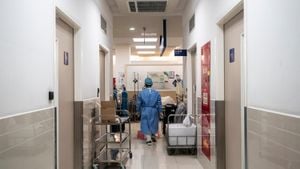An outbreak of metapneumovirus is currently affecting several regions of Russia, leading to significant illness reported among residents, especially children and the elderly. Health professionals are closely monitoring the situation as symptoms, including high fevers and severe coughs, have caused concern.
Reports indicate the metapneumovirus, believed to have originated from China, has spread to areas including Sverdlovsk Oblast, Buryatia, and the Republic of Altai. According to the Telegram channel Shot, the infection primarily targets children under three years old and adults older than 65, raising alarms about their health.
Residents of these regions have flocked to clinics as the number of cases has surged. “We’re seeing longer wait times at medical facilities due to high demand,” one healthcare professional noted. The symptoms are said to mirror those of common respiratory viral infections (ARVI), including fever, sore throat, cough, and runny nose.
For many, the illness lasts longer than usual. One Moscow resident reported experiencing debilitating symptoms: “I’ve been suffering with high temperature and cough for over a week.” Others have echoed similar experiences, expressing frustration at the lack of effective antiviral treatments.
“Consultations are often turned away, with many advised to visit the clinic instead,” said another concerned family member. Many families are reporting outbreaks within households, with instances where one child contracts the virus, only to expose siblings and parents.
Yet, experts stress the situation is not unprecedented. “The metapneumovirus is not new,” said immunologist Nikolay Kryuchkov. “This virus typically circulates globally, and our population has some level of pre-existing immunity.” Although specific treatment does not exist, infections are usually mild and don’t require hospitalization.
Most concerning are the potential complications, particularly for vulnerable populations. “Children, especially younger ones, may experience serious respiratory issues,” stated Alexander Chuchalin, head of the department at Pirogov Medical University. Symptoms can escalate to conditions like bronchitis or acute respiratory distress syndrome.
Health care providers recommend standard supportive care, such as oxygen therapy for severe cases, and have advised parents to monitor their children for symptoms diligently. “If signs of respiratory difficulty appear, immediate medical attention is necessary,” added Chuchalin.
Despite the rising number of cases, officials from the Russian Ministry of Health indicate the overall incidence rate remains low – only 0.3% of ARVI cases so far. Nevertheless, the report does spark interest as authorities continue to observe patterns closely.
“We’re prepared with strategies from previous respiratory virus outbreaks. Hand hygiene and social distancing measures, if necessary, can help mitigate spread,” said Deputy Director Alexander Gorelov from Rospotrebnadzor, the federal health watchdog.
The symbolic link to COVID-19 has stirred some unease among the public. “People are concerningly comparing this outbreak to previous pandemic experiences,” added Gorelov. “While the magnitude is different, vigilance is still important.”
Recommendations include frequent handwashing and avoiding crowded places, especially for those with high-risk family members. Parents are advised to keep children with symptomatic illnesses at home to prevent transmission.
Some residents have even proposed emergency measures, such as temporary remote schooling if active infections spread within school settings. “If many kids are sick, shutting down classrooms may be warranted,” suggested one concerned parent.
Overall, Russia remains on alert as it navigates the metapneumovirus outbreak amid seasonal flu strains and other respiratory infections. While the number of cases is manageable for now, medical experts urge continued attention to public health recommendations and heightened awareness of symptoms.
“Many of us have immunity against this virus, reducing its severity,” asserted health expert Elena Meskina. “Therefore, we shouldn’t panic, but rather remain informed and prepared.”
Clinics continue to provide necessary support and medical advice, emphasizing the importance of community resilience during such outbreaks. It is hoped preventive measures and public health engagement will mitigate the impact of any potential uptick.



